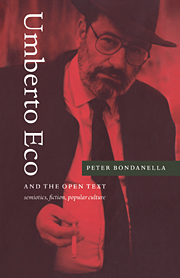Book contents
- Frontmatter
- Contents
- Preface
- ONE Umberto Eco's intellectual origins: medieval aesthetics, publishing, and mass media
- TWO The Open Work, Misreadings, and modernist aesthetics
- THREE Cultural theory and popular culture: from structuralism to semiotics
- FOUR From semiotics to narrative theory in a decade of radical social change
- FIVE “To make truth laugh”: postmodern theory and practice in The Name of the Rose
- SIX Interpretation, overinterpretation, paranoid interpretation, and Foucault's Pendulum
- SEVEN Inferential strolls and narrative shipwrecks: Six Walks and The Island of the Day Before
- EIGHT Conclusion
- Bibliography
- Index
EIGHT - Conclusion
Published online by Cambridge University Press: 23 October 2009
- Frontmatter
- Contents
- Preface
- ONE Umberto Eco's intellectual origins: medieval aesthetics, publishing, and mass media
- TWO The Open Work, Misreadings, and modernist aesthetics
- THREE Cultural theory and popular culture: from structuralism to semiotics
- FOUR From semiotics to narrative theory in a decade of radical social change
- FIVE “To make truth laugh”: postmodern theory and practice in The Name of the Rose
- SIX Interpretation, overinterpretation, paranoid interpretation, and Foucault's Pendulum
- SEVEN Inferential strolls and narrative shipwrecks: Six Walks and The Island of the Day Before
- EIGHT Conclusion
- Bibliography
- Index
Summary
Umberto Eco will turn 65 shortly before the time this book appears in print, but there is very little chance that he will retire from active writing and lecturing to a contemplative life. In many ways, he is presently at the height of his creative powers. He has earned almost every important sign of recognition on several continents, as well as international fame as a best-selling author of popular (albeit difficult) novels. Any conclusion about his contribution to the lively intellectual ferment that has characterized postwar Italy and Europe will therefore of necessity be only provisional, since there is little doubt that Eco will continue to write actively for years to come.
Like Fellini, Calvino, Pavarotti, or Armani, Umberto Eco represents one of the very few Italians who enjoys an international reputation and instant name recognition today by the general public. By virtue of his tireless travels and lectures in a variety of languages, Eco has also become something of a cult figure in Italy and abroad, and his fame resounds not only in the ivy-covered halls of academe but also has a general resonance that few contemporary European intellectuals can match in any country outside of Italy.
Within Italy, Eco's early works – those essays and treatises that preceded The Name of the Rose – were tremendously influential. They attacked the premises of Crocean aesthetics that had dominated Italian intellectual life for decades even before the war, laid the foundations for a non-Marxist approach to culture which was progressive and original, and justified the study of cultural phenomena that did not limit itself to a notion of “high” culture.
- Type
- Chapter
- Information
- Umberto Eco and the Open TextSemiotics, Fiction, Popular Culture, pp. 192 - 199Publisher: Cambridge University PressPrint publication year: 1997



